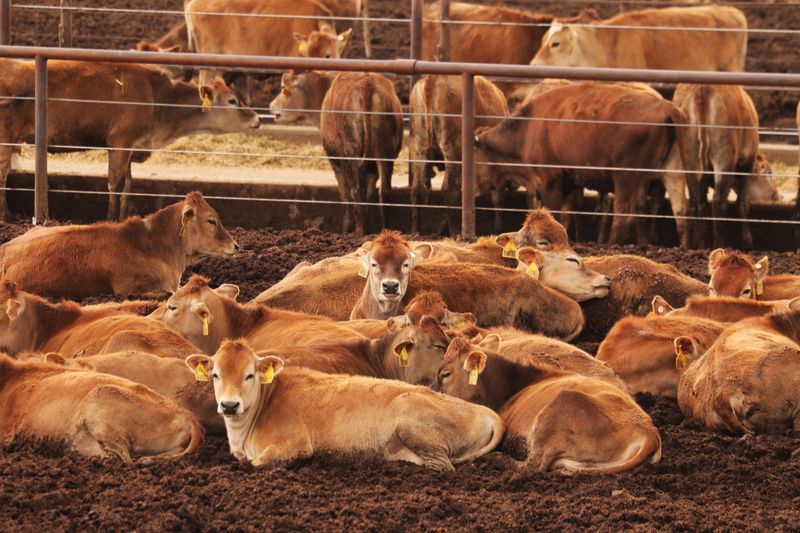By Leah Douglas
(Reuters) - Climate advocacy groups are pressuring world governments gathered at this year’s United Nation’s COP28 climate conference in Dubai to commit to cutting global food sector emissions, as the conference host promises to put agriculture in the spotlight.
Global food systems- including farming and land use, livestock production, household food consumption and waste, and energy used in the farm and food retail sectors - account for 31% of human-made greenhouse gas (GHG) emissions, according to the United Nations' Food and Agriculture Organization (FAO).
But few governments have ever published numeric targets for lowering those emissions, focusing instead mostly on the use of fossil fuels for power, transport and industry, according to climate advocates.
"Business as usual food systems would use nearly the whole carbon budget for a 2-degree Celsius world. We need to implement food systems approaches throughout COP28," said Joao Campari (LON:0ROY), global leader of food practice at the World Wildlife Fund.
A full day of the 28th Conference of the Parties (COP), Dec. 10, will be dedicated to food and agriculture - a first for any COP - and the United Arab Emirates host has said the event will be a "game-changer for food systems."
Advocacy groups say countries should take the opportunity to commit to stronger action on food system emissions in their national climate plans, called Nationally Determined Contributions (NDCs).
Many NDCs mention agriculture, but just 53 of 164 countries who had submitted NDCs to the U.N. as of September 2022 included quantified GHG goals for agricultural sub-sectors, according to CGIAR, a global food security research group.
The United States, India, China and Canada are among the countries that did not have quantified mitigation goals.
Advocates would see clearer accounting of food system emissions and targets to reduce them, as well as discussion of issues like biodiversity and healthy, sustainable diets.
"That’s a minimum baseline to understand the role of food systems and its connection [to climate change]," said Patty Fong, program director for climate, health and wellbeing at the Global Alliance for the Future of Food.
Doing so could also unlock financial investment in tackling food emissions, said Saswati Bora, global director for regenerative food systems at the Nature Conservancy.
Food systems received just 4.3% of global climate finance in 2019 and 2020, according to the Climate Policy Initiative.
"To have this increasing attention at the global level helps direct some of the support that’s needed for producers to transition food production to be more climate-friendly," Bora said.
TACKLING METHANE
A key goal for advocates is reducing methane emissions from food sectors like livestock production and food waste.
Methane is about 20 times more potent than carbon dioxide over a 100-year period. Food systems generate 53% of the world's methane emissions and about two-thirds of agricultural methane is from livestock production, including cow burps and manure management, according to the FAO.
Heightened awareness of livestock methane emissions should lead to global commitments to cut them, much in the same way the Global Methane Pledge launched at COP26 commits countries to reduce their methane emissions 30% by 2030, said John Tauzel, senior director of global agricultural methane at the Environmental Defense Fund.
Wealthier countries should support farmers in implementing technology like biodigesters that capture manure emissions for energy production, while poorer countries should help farmers improve animal feed and livestock digestion, Tauzel said.
Countries should also make stronger commitments in NDCs on food waste, said Liz Goodwin, director of food loss and waste at the World Resources Institute.
Food waste generates half of all global food system emissions according to a March study published in the journal Nature Food.
"That puts it clearly on their government agenda (and) it means they’ve got to actually do something about it," Goodwin said.
The members of the U.N. pledged in 2015 to halve global food loss and waste by 2030, but the world has collectively made little progress towards the goal and some countries waste even more food now.
